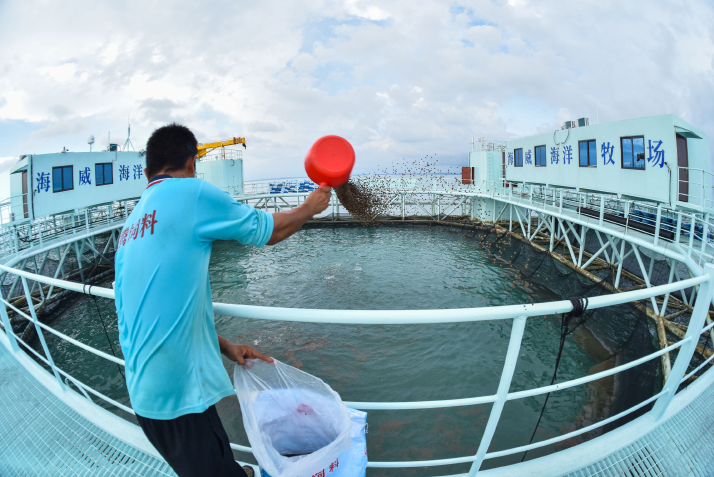| Fact Check |
| A blue granary | |
|
|
 A staff member feeds golden pomfret fry in one of the pens of Haiwei-2, an intelligent semi-submersible aquaculture platform off the coast of Zhanjiang, Guangdong Province, in September 2023
On May 13, the Ministry of Natural Resources and the Ministry of Agriculture and Rural Affairs jointly issued a guideline on optimizing the management of areas under marine aquaculture production. The new guideline is part of China's ongoing efforts to ensure food security. During his inspection tour of Guangdong Province in April 2023, President Xi Jinping underlined the importance of using both land and sea for food production. In his view, the sea has the potential to become a "blue granary" with fish and other marine products grown in aquaculture becoming a cornerstone of the Chinese diet. To build a blue granary, it is imperative to sustainably increase the output of marine ecosystems with the use of science and technology to provide food and other products. China's area under marine aquaculture production has now reached around 2 million hectares and has become an important source of food alongside the country's 120 million hectares of arable land. The series of measures proposed in the recent guideline focus on three key points: The first is promoting the intensive use of marine resources. At present, China's coastal waters are being developed on a large scale, but the methods are often inefficient. By taking an evidence-based approach to the scale, layout and management of marine aquaculture, China will be able to make better use of its marine resources. The second is promoting the high-quality development of marine aquaculture. As the world's largest producer of aquaculture products, China will promote the upgrading of marine aquaculture, and stabilize and expand the supply of marine aquaculture products, laying a solid foundation for the establishment of the blue granary. The third is strengthening the protection of the marine environment. At present, the substandard development of marine aquaculture in some regions has negative impacts on the local marine environment, and the over-exploitation of marine aquaculture in some regions affects the function of coastal wetlands. By optimizing the management of the industry and strictly controlling its expansion, China will be better able to protect its marine environments. In the mind of many Chinese, building a blue granary not only contributes to food security, but also raises people's living standards. The cultivation of grain such as rice and wheat is seen as the foundation for food security, while the production of meat, fruit, vegetables and aquatic products meets dietary needs at a higher level. This is particularly true of marine products considered to be luxuries, such as lobster, sea cucumber and abalone. A consensus has been reached that increasing the supply of high-quality aquatic products will help increase the total food supply and reduce pressure on livestock and poultry products. Moreover, under the framework of the 21st-Century Maritime Silk Road, part of the Belt and Road Initiative, the construction of a blue granary will promote international cooperation through the joint development and protection of marine resources. China has signed agreements for Belt and Road cooperation with more than 150 countries since it first put forward the initiative in 2013. China's efforts to protect the marine environment while achieving sustainable utilization of marine resources can contribute to global food security and marine protection. Copyedited by G.P. Wilson Comments to lanxinzhen@cicgamericas.com |
|
||||||||||||||||||||||||||||
|